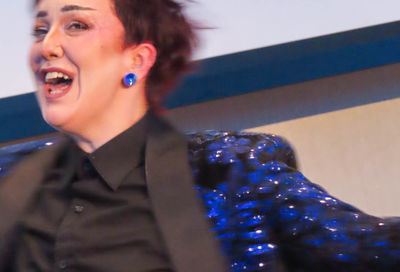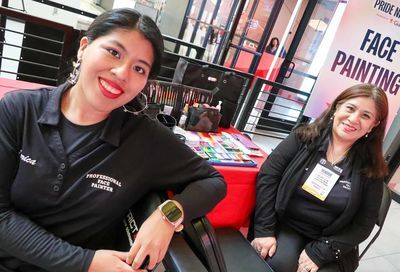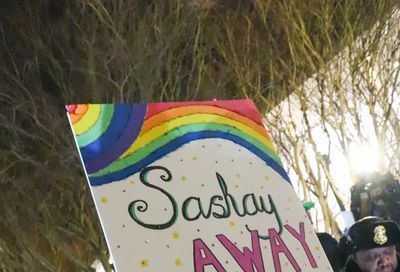Senegal lawmakers want to double jail time for LGBTQ people and imprison equality advocates
Law would jail people for up to 5 years for penning pro-LGBTQ social media posts, and intersex people would be jailed for 10 years for merely existing.

Senegalese lawmakers are proposing a bill that would double the length of sentence for LGBTQ people convicted under the country’s law criminalizing homosexuality, and would even impose prison sentences for those who merely advocate for LGBTQ equality.
On Dec. 13, lawmakers in the heavily Muslim nation announced they had drafted legislation to impose a maximum penalty of 10 years in prison for individuals convicted of engaging in same-sex activity, reports Reuters.
Currently, the country’s penal code imposes a sentence of up to five years in prison, along with a fine, for any person who “commits an indecent or unnatural act with an individual of his or her own sex.”
The bill has been proposed for more than two years, but lawmakers were prompted by demonstrations by anti-LGBTQ activists in May calling for the government to impose enhanced penalties for LGBTQ people, with some protesters even demanding that LGBTQ people be “burned.”
Senegal “is homophobic and will remain so forever,” one protester told the Agence France-Presse at the time. Another protester, representing an association for young Muslims, told AFP she attended the rally to protest homosexuality and demand its criminalization.
But the proposed law would go beyond punishing same-sex relations or gender-nonconformity, according to the LGBTQ blog Erasing 76 Crimes, which covers efforts to decriminalize homosexuality in various countries throughout the world. If signed into law by Senegalese President Macky Sall, the bill would impose a sentence of three to five years in prison — plus a fine — for advocating for LGBTQ rights, even on a person’s private social media accounts.
The bill would also imprison intersex people, or those born with ambiguous genitalia, just for existing, though the bill is not clear about how such prosecutions would be carried out.
While Sall has yet to take a position on the proposed legislation, he has previously refused to decriminalize homosexuality and has expressed anti-LGBTQ animus in some of his past comments.
LGBTQ advocates have condemned the bill, noting that “no mitigating circumstances” can be considered when prosecuting people accused of engaging in same-sex relations, and that some of the language unfairly demonizes LGBTQI people with necrophiliacs.
“This is absolutely ridiculous for a country that is supposed to be known for its hospitality,” Djamil Bangoura, the president of Senegalese organization Association Prudence, told The Washington Post. “More and more people are being judged and tortured and imprisoned for their sexual orientation.”
See also: A proposed law in Ghana would jail people who advocate for LGBTQ equality for up to 10 years
Bangoura also called on the international community to pressure Senegal to defeat the proposed legislation.
“When individual freedoms, in particular the most sacred — privacy between consenting adults — are attacked, then there is little time left to realize that democracy is in danger,” he told CNN.
Critics of the law note that even prior to the bill’s introduction, LGBTQ people are regularly harassed and persecuted within Senegal. A series of videos obtained by TV news station France 24 showed mobs of people harassing and assaulting men suspected of being gay. In one video, attackers demanded that the man’s testicles be “cut off” in order to “make him a woman.”
The Free Collective, an organization advocating for equal rights, which would be criminalized under the bill, argued that anyone critical of homophobic attitudes in the country could be punished by an overreaching government.
“The Free Collective recalls that just two weeks ago a presumed homosexual was sentenced to five years in prison in Kaolack. The human rights situation for LGBTI people is already very difficult on a daily basis even before enduring several months of overheated rhetoric and political tension stirred up by such a bill,” the organization said in a statement.
“Finally, the Free Collective does not want Senegalese families to experience the tragedy of exclusion and rejection of LGBTI people as a result of the issue of homosexuality being used as a political tool,” it concluded. “Homosexuality has always existed in Senegal, as it has everywhere else, and LGBTI people are a full-fledged component of Senegalese society that has the right to respect, just like everyone else.”
Read our other coverage:
Mr. Gay World 2021 gives up title, accuses competition of “unlawful” conduct
Swimming World editor compares UPenn swimmer Lia Thomas to a “doped” athlete
Support Metro Weekly’s Journalism
These are challenging times for news organizations. And yet it’s crucial we stay active and provide vital resources and information to both our local readers and the world. So won’t you please take a moment and consider supporting Metro Weekly with a membership? For as little as $5 a month, you can help ensure Metro Weekly magazine and MetroWeekly.com remain free, viable resources as we provide the best, most diverse, culturally-resonant LGBTQ coverage in both the D.C. region and around the world. Memberships come with exclusive perks and discounts, your own personal digital delivery of each week’s magazine (and an archive), access to our Member's Lounge when it launches this fall, and exclusive members-only items like Metro Weekly Membership Mugs and Tote Bags! Check out all our membership levels here and please join us today!






















You must be logged in to post a comment.